Just before Covid-19 began dominating headlines around the world, Dana Rensi, Powering Potential’s Regional Director for Latin America, was back at work in the San Francisco School located in the Belen District of Iquitos, Peru. A brand new SPARC lab with 25 Raspberry Pi computers had been installed in the school last summer by the Powering Potential team with a grant from Learning Equality.
Dana arrived on February 23, 2020 to train nearly two dozen teachers in the lab on its maintenance and usage. Mid-March marked the official start of the school year in Peru, which meant only in-service meetings among the teaching staff were conducted. It was an opportune time to get the teachers ready.
Then the shutdown happened.
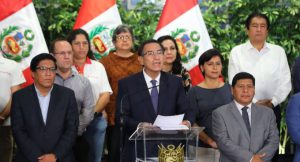
On March 16, the Peruvian government entered a state of emergency after informing the public of a mandatory shut down. Since March 16th was also the first day of school, students across the nation were alerted to stay home. Businesses were shuttered. Waterways, airports, and roads were closed throughout the nation. In less than 24 hours, Iquitos became a ghost town.
“I’d been watching the Covid issue even before I went back to Peru,” Dana said. “When the shutdown happened, I got online, bought another plane ticket for March 31st even though I already had one for April 15th. Then I immediately started emailing the Fulbright commission in Peru, the U.S. government, and everybody else.”
Along with the government mandate came the nationwide closure of schools and strict quarantine guidelines. A curfew was instituted from 6 p.m. – 4 a.m. Food became scarce at the local markets. Fresh water delivery, a critical service due to the polluted water surrounding Iquitos, suddenly became difficult to acquire. Regulations required officers to arrest and fine people for failing to wear masks outdoors.
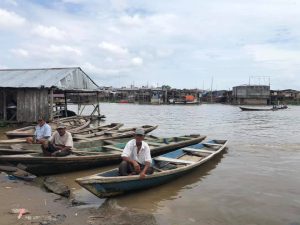
The shutdown would eventually strand more than 7,150 travelers within Peru’s borders. Of those 7,000, Dana was among the 1,400 Americans facing a global pandemic that was quickly spreading to the jungle. She was sequestered blocks away from the Plaza de Armas de Iquitos and turned her tiny apartment into a command center. Manning two mobile phones and a computer, she began contacting everyone she could regarding the situation.
“You have to understand something about the situation in Peru,” Dana said. “They don’t really have medical care there. They don’t have Covid tests. They have only one hospital in Iquitos for Covid, but there was an infected nurse. So they had to move everyone and sanitize everything. Their best defense was to lock everything down.”
The Fulbright Commission was among the first of the organizations to respond to Dana’s alert. Representatives there put her in touch with the Peruvian Embassy, which asked her to be a Citizen Liaison Volunteer (CLV). After a background check, the Embassy had her gather information on all U.S. citizens in Iquitos. Dana made a Google Form for people to enter their information and forwarded daily updates to the Embassy. She also found vital information on everything from the availability of medical supplies to viable transportation companies and permits. The Embassy used this data to obtain permission letters enabling these services to work during the quarantine and solidify travel arrangements. Through Twitter, Facebook, and WhatsApp groups like #StuckinIquitos, Dana also strove to keep everyone calm during the next two weeks.

It was through one of these social media groups that Alia Afshar, DAI Director of Project Delivery in the Middle East and North Africa, got in touch with Dana. In Peru on a spiritual retreat for two weeks to celebrate her birthday, the shutdown stranded Alia and several other tourists at the sanctuary.
“Dana is, to me, a real hero,” Alia said during a discussion with Powering Potential. “She was frantically working with the authorities. It really blew my mind, and I work in war zones where everything is down to the details. She did such an impeccable job. ”
Barbara Land, Executive Director of the Nevada Building Hope Foundation was also doing work in the Peruvian jungle in March. Her organization provides a variety of critical services to remote villages along the Amazon River and had just finished building a new high school for students last October. Barbara would eventually join the #StuckinIquitos group chat regarding her own situation. “I would see Dana telling people to continue working with the Embassy,” Barbara told us. “For people who work down there, we know how wonderful the Embassy is. We became friends that way. She understands the culture.”
Peru’s shutdown created panic among the tourists. Within a week, throngs of people arrived in Lima with the intent to leave, only to find the airport closed. Entire groups camped out at the air force base waiting in lines that never moved. Others were still stuck in remote lodges without a way to get back to the main squares. Coming back required boats, none of which were allowed on the water.
It fell to Dana to find boat drivers and transportation services so the Embassy could create letters and permits to ensure their businesses would not be fined for traveling during the quarantine. It would eventually require three permits from the water police to even take a boat for twenty minutes. After this, buses were hastily found and granted permits to pick up travelers from the remote sites on the rivers. Even so, a larger problem loomed: flights.
With Lima and its airport bombarded by crowds, the Coronel FAP Francisco Secada Vignetta International Airport in Iquitos was allowed to open. Located only 4.5 miles from the downtown area of the city, it had not serviced international flights for some time. Locals spoke of popular routes to Panama and other regions of South America that had been long discontinued. Despite the Covid-19 crisis, very few there thought this situation would change. Lima, they said repeatedly, was the only way to leave.
Over the course of two weeks, the Embassy negotiated with the Peruvian government for approval regarding a flight. Once this hurdle had been cleared, the next one was asking for a chartered flight from Latam Airlines, the premier carrier for Peru. Through hard work and a touch of the miraculous, a flight plan was finally arranged that would fly directly to Miami. If successful, it would be the first such flight to leave Iquitos in over twenty years. Letters of transit for both river and land travel also had to be obtained from the Embassy for people to make it safely to the airport.
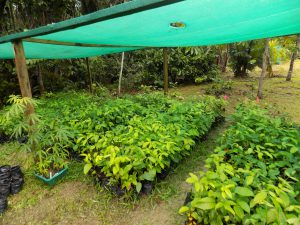
Don Dean, Tree Committee Member and Board Member of Project Amazonas, had also been affected by the shutdown. He is one of many dedicated individuals working on the conservation and restoration of the Amazon Rainforest. In addition, they reintroduce native species back into their natural habit there. In mid-March, he’d been overseeing a group of undergraduate students from North Carolina when the government went into a state of emergency. He was one of many people to secure a flight home due to Dana’s efforts.
“As Dana mentioned, it was a mess to get out of the country,” Don recounted. “They shut down the streets and rivers. The airports were closed. We were all in limbo after that. Dana took me by the ear, said ‘fill out these forms,’ and just got it done. She worked diligently to get everybody.”
Alia concurred, further emphasizing the importance of Dana’s contributions. “To be fair, my position was unique — I was at a private sanctuary. Everything was running normally for us, but going to Iquitos for the 24 hours we were there was terrifying. Dana organized transport and a place for us. She worked locally through Peruvians. The confidence level and commitment were just through the roof. She had printed packets for all of us with permits to travel to the airport. I was in awe.”
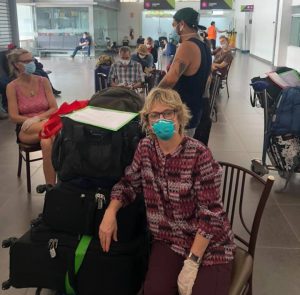
On March 26th, 2020, 107 Americans left from the airport in Iquitos after health screenings, Dana among them. All wore masks and gloves. Some spoke openly about the people and work they’d left behind. Others stood silent with pensive expressions, fearing the flight would be canceled. Yet the flight and its passengers landed without incident in Miami.
It would take two additional flights for Dana to return safely to Oregon, but her work didn’t stop when she landed. Even during her self-quarantine, she continued working to gain transportation and flights for others still struggling to get home from Peru. When asked to expound on their feelings at being back on American soil after such ordeals, all of those featured in our story expressed various levels of shock and gratitude.
“Police and military were everywhere in Peru,” Dana explained. “They checked your papers. You were arrested and fined for not wearing a mask. I am shocked that some people are not taking it seriously. I know my connections were what enabled me to help people on the ground. I am really thankful for the U.S. Embassy and the Peruvians. It was a huge operation.”
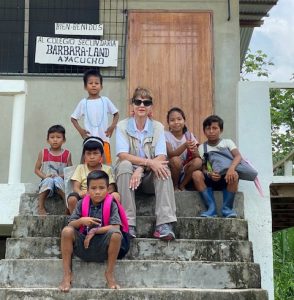
Barbara had a similar reaction. “Peru is on total lockdown. We got into Dulles airport in the middle of the night and not one person had a mask on. Nobody was taking precautions. That’s the way it was all the way to South Carolina to Phoenix to Reno. I’m still surprised.” She added that those with a calling to help in the Amazon should prepare now. “We all are there to help one child, one person at a time. That’s better than nothing. But if your project is not sustainable, you’re wasting their time. It’s their responsibility to love and respect that jungle and all that lives there. See the world through the eyes of the people you are living with. Do your research. Then join us.”
“It was humbling,” Alia said of her experience. “Latam Airlines was wonderful and had medical staff there. They took temperatures. It was jarring that there were no quarantine guidelines in Miami or JFK.” She also offered some advice to her fellow Americans. “Being safe will cost us things in the long run. Sure, everybody wants to go back to their old lives, but it’s going to slow down a path to recovery. Remember: there’s no playbook for this.”
“I think the Peruvians were way ahead of the states in terms of preparing and taking action out of necessity,” Don commented. “They could also impose huge fines on people during the quarantine that stick because the authorities attach them to their national identity card. So these are effective deterrents. I understand that. It’s easier to enforce. But it’s all a waiting game now to get back to our work.”
Dana, Alia, Barbara, and Don felt they’d left behind a situation without easy solutions. According to a statement from the United Nations Development Program, the first indigenous leader in Peru tested positive for Covid-19 mere days after the shutdown. In addition to national quarantine protocols, non-residents were immediately restricted from entry into the Indigenous and Territorial Reserves under orders from the Ministry of Culture. Over 2,000 communities also chose self-quarantine measures to further isolate themselves from exposure from tourists.
Though vital steps have been taken to ensure the health of the Peruvian people, the state of education there remains critical. According to the World Education Blog, MINEDU (the Peruvian Ministry of Education) has created Aprendo en casa as a distance learning initiative for the nation’s students operating through telecommunications companies. Most children in impoverished districts like Belén and remote areas of the jungle, however, do not have computers or the Internet. The children are simply at home without even access to food. For them, the pandemic is a very real struggle for survival.
Dana is currently collaborating with Patty Webster, CNN Hero and Founder of Amazon Promise to address these issues. In a recent letter published on the home page of their website, Patty explained her organization’s commitment to delivering medicine, medical supplies, and infant formula to local hospitals in the fight against the pandemic. Dana is also asking the Peruvian government to release the food stored in the nation’s closed schools to feed the poor, including the children of the San Francisco school whose only meals consisted of those they received during the school day.
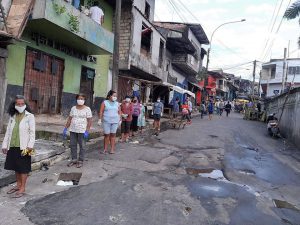
“I do want to go back,” Dana said. “Powering Potential has the only solar Raspberry Pi computer lab installation in Peru working among the poorest of the poor. Anita Gil Avila is such a dynamic school principal. She’s there day and night. We picked the right person to partner with. I am so grateful to Learning Equality and the other team members of Powering Potential. This is a huge opportunity for the people. They really need our support.”
If you would like to learn more about the Covid-19 situation in Peru you can follow the latest updates on the website for the Ministry of Health – Peru. We encourage our readers to support Powering Potential’s effort to provide technology education in the Peruvian Amazon when the schools resume regular operations. To donate, click here.